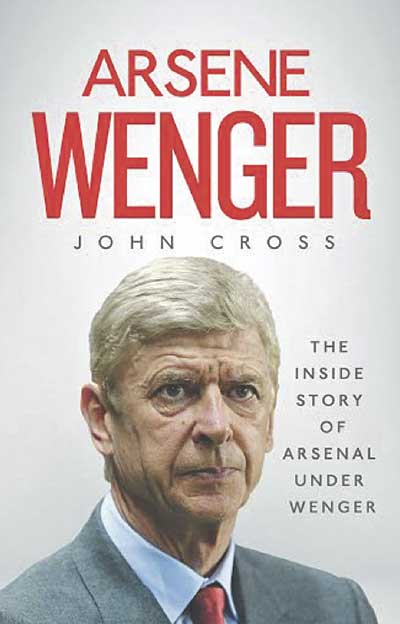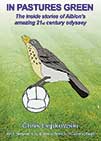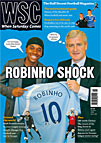Search: 'John Hartson'
Stories
 by John Cross
by John Cross
Simon & Schuster, £20
Reviewed by David Stubbs
From WSC 346 December 2015
Supporters of one of the Big Four Or Five teams each have different ideas why their club, overbearingly large as it might seem, actually has some core value. For Arsenal, there was once a sense of shame even among their own fans that they were one-nil blaggers who added little to the overall value of the game. That has turned round completely under Arsène Wenger.
Although, as many interviewed by John Cross in this latest biography testify, he is perhaps an even worse loser than Alex Ferguson, Wenger holds fast to what is vaguely described as his “philosophy”, which has traditionally consisted of valuing attack over defence, maintaining aesthetic values rather than grinding out victories, imposing your own style of play rather than merely reacting to your opponents.
This is a source of pride to Arsenal fans but also, increasingly, exasperation, one only partly stemmed by the recent two trophies and a softening of said philosophy. His baffling reluctance to spend available funds has also led to some stormy AGMs, with fans suspicious at the amounts they must today shell out to watch their fitfully aesthetic but too often brittle also-rans.
Mirror journalist Cross is not to able to answer the question of whether Arsenal’s relative lack of spending is down to Wenger himself or the club, who have become complacently happy with their cash cow. From the earliest pages, we know from Cross’s admiring tone towards Wenger not to expect any scathing, incisive critiques of his subject; he is far too valuable a contact in the author’s day job.
He begins with an account of how he visited Pope Francis rather than attend to transfer deadline day, in terms inviting us to marvel at the manager’s spirituality and indifference to the mammon of the modern game. The text is similarly lavished with borderline sycophantic tributes to Wenger’s intellect, erudition and integrity, lest this sometimes thin-skinned man take the slightest offence.
The book, however, does yield some intriguing facets of his time at Arsenal, where he arrived in 1996 to bewilderment from its core of bibulous, hard-bitten professionals, whose careers and habits he turned upside down, generally for their own good. Cross is decent on Wenger’s golden years, and details of the new regimen he instilled, drawing on interviews with ex-players such as John Hartson and Nigel Winterburn.
For a man whose hobby as an escape from watching football is generally assumed to be watching football, Cross reveals one or two fun details about the private Wenger; his interest in politics, and his belief that both communism and capitalism are failed systems; his love and aptitude for dancing, which would probably see him progress a long way on a future series of Strictly, for example. He also reveals less palatable aspects of Wenger, such as his occasionally short way with staff, and his snubbing of Gaël Clichy, or examples of his loss of temper with players, such as the time Nicklas Bendtner was taking the piss out of X Factor: “You think there is something funny about losing?” He also reveals how close Arsenal came to not being able to pay their wage bill during a cash flow crisis in 2004.
While Cross’s prose is not exactly silvery, this is about as revealing an account of Wenger’s career as we’re likely to get in his lifetime.
 The inside stories of Albion’s amazing 21st century odyssey
The inside stories of Albion’s amazing 21st century odyssey
by Chris Lepkowski
Shareholders for Albion, £16.99
Reviewed by James Baxter
From WSC 315 May 2013
Written by West Bromwich Albion’s Birmingham Mail correspondent Chris Lepkowski, this book uses in-depth interviews with 12 players to present the inside line on “Albion’s amazing 21st century odyssey”. While the last 12 years have delivered four promotions, three relegations and the 2004-05 “great escape”, they have also seen Albion transformed from a chaotically run institution who gave Wolves fans something to joke about into one of the Premier League’s most forward-thinking clubs.
In its way, In Pastures Green reflects this transformation. The earlier interviews, especially those dealing with Gary Megson’s time, are genuinely revelatory in places. Dutch midfielder Richard Sneekes doesn’t bother to conceal his contempt for the manager, describing his style of football as requiring “running for the sake of running”. Striker Bob Taylor, meanwhile, was brought back to The Hawthorns by Megson in 2000 but, by the end of his final season three years later, he had been frozen out. He believes that Megson’s decision to allow him a start in the last fixture, at home to Newcastle, was made purely to humiliate him since he was nowhere near match fit. Taylor is further convinced that, as he was being helped off the field after sustaining an early injury, Megson was laughing and joking – “milking the situation” – on the touchline. “As a person,” Taylor concludes, “[Megson] is a shithouse.”
At the end of the book there are further criticisms of a manager (or rather head coach) but Robert Koren and Paul Scharner are far more restrained in what they have to say about Roberto di Matteo, who “kept his distance” and “didn’t like to get too close to his players” according to Koren. Scharner’s chapter offers Albion fans little beyond a story most will recall from local media reports of January 2011. This was a period when the team were going through a poor run of form and Scharner suggested that the abandonment of the players’ self-policed system of fines for minor acts of indiscipline was among the reasons.
Cancer sufferer John Hartson, who left Albion in 2008 as his health went into decline, gives by far the most moving interview, expressing regret at ignoring an appointment with a specialist that was made for him by Albion’s club doctor, Kevin Conod. “Kevin did everything in his power to help me… but doctors aren’t going to hold your hand and take you to the specialist.” There is more to In Pastures Green, including a few throwaway, if entertaining, tales of dressing-room high-jinks. For his own part, Lepkowski is a discreet narrator who allows his interviewees to tell their stories without the need for too many interjections. Shareholders for Albion, who commissioned the book, break up the narrative with regular accounts of the state of the club’s finances. Those not interested in the intricacies of share issues and the like can safely skip the passages concerned. They certainly do not detract from a fine read – one you don’t need to be an Albion fan to appreciate.
 AFC Wimbledon’s promotion to the League provides optimism for a supporter-led future, yet Andy Brassell also remembers the machinations in SW19 that led to the death of the original club
AFC Wimbledon’s promotion to the League provides optimism for a supporter-led future, yet Andy Brassell also remembers the machinations in SW19 that led to the death of the original club
Never mind May 28, 2002 – I remember exactly where I was on January 15, 1999. Sitting on the sofa at home with some mid-morning tea, Teletext told me that Wimbledon had signed John Hartson from West Ham. For £7 million. Seven million pounds. My mug hit the floor. Not for the last time in the years to come, Wimbledon FC were involved in the previously unthinkable.
 Ian Plenderleith ploughs through the ruminations of Setanta's pundits
Ian Plenderleith ploughs through the ruminations of Setanta's pundits
I once worked for a website that took contributions from professional footballers, but the only player who regularly sent us copy was so inane that the impossibility of turning his column into something interesting or readable caused you to take the only option available – to bury your head in your hands and weep. Another player we approached who had written some sensible blog entries on his own personal site turned us down politely on the grounds that writing a blog had been fun for the first few weeks, but then it had started to seem more “like homework”.